In an age of pharmaceuticals, we tend to forget that there are additional remedies such as herbal teas that can improve those who have diabetes. Herbal teas are once again gaining popularity in the United States, and this could be due to the infusion and acceptance of Western and Eastern Medicine techniques being blended more often.
Living with diabetes doesn’t mean you’ll have to stop enjoying a relaxing tea time with your friends and family. You may not know, but tea offers specific benefits for people living with diabetes – provided you ditch the sugar, and of course, that milky brew too. Diabetes is one of the most common diseases in the world, which is spreading like an epidemic. Not only adults but children are also affected by it. A lot of it happens because of a bad lifestyle, poor eating choices, and erratic sleeping patterns. A lot of it is because of hereditary reasons. Diabetes is mainly classified into type 1 and Type 2.

Tea is full of healthy substances that can help improve and protect your health in several ways. Some of the health benefits of tea are –
- It improves insulin sensitivity
- It helps maintain healthy blood pressure
- It prevents blood clots
- It reduces the risk of developing type 2 diabetes
- It lowers the risk for cardiovascular disease
- It helps with weight loss
- It lowers the risk of cancer
Research has shown that the health benefits of tea are best experienced if you drink it without milk. Try these eight healthful teas that are easy to prepare and great for lowering blood sugar levels as well as reducing body fat:
1. Green tea for Diabetes
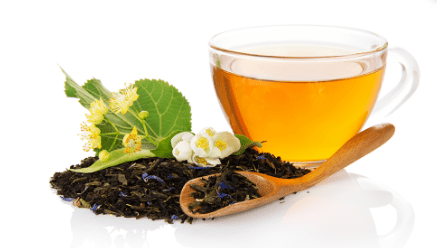
Green tea, perhaps, is one of the most loved health beverages in the whole world! Enjoyed by people of all ages, it is mainly consumed by fitness enthusiasts. Known for its weight loss property, the green brew has many other health benefits. People suffering from high blood sugar can easily consume green tea for diabetes. Over the years, it has been noted that the antioxidant and anti-inflammatory properties of this tea have helped in controlling many health ailments, including diabetes.
Several studies suggested green tea can benefit people with both type 1 and type 2 diabetes. Green tea contains some beneficial polyphenols, including epigallocatechin gallate (EGCG), which improves insulin sensitivity and combats obesity. Green tea is considered one of the healthiest foods that help with weight loss. Green tea is one such beverage, which can help fight type 2 diabetes in more ways than one. If you include this brew in your everyday diet, you will notice that your blood sugar will normalize. You will also feel energetic enough to go on long walks or exercise harder at the gym. Essentially a 0 calorie beverage, the green brew is also known for hydrating the body. It is an excellent beverage to add to a diabetes diet because it helps in improving metabolism, which is affected by the rise in blood sugar levels.
2. Black tea for Diabetes
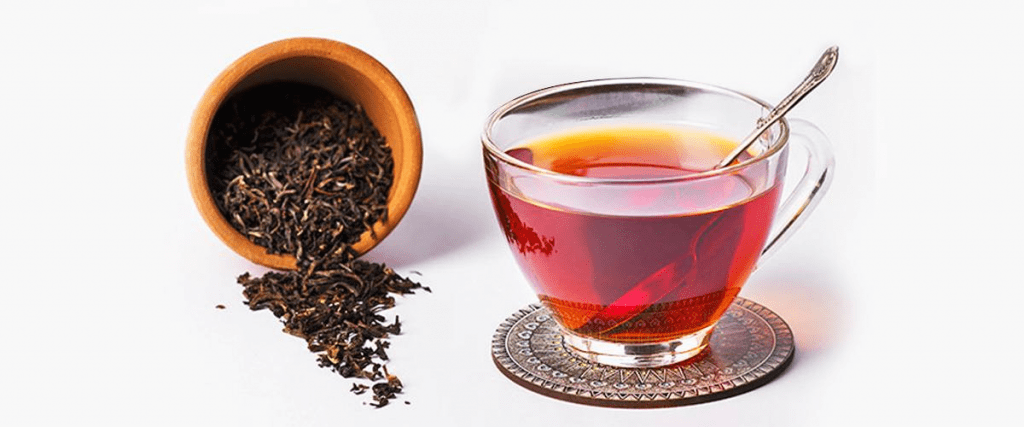
Like green tea, black tea harbors several substances that can help reduce the risk of type 2 diabetes. Black tea also contains a special polysaccharide compound that acts almost exactly like the diabetes drugs Precose and Glyset – prescribed for type 2 diabetes. Read Seven good reasons to drink black tea every day.
A 2008 study carried out by the University of Dundee reported that black tea contains theaflavins and thearubigins, which are found to act like insulin. According to a study conducted by the University of California, black tea may help lose weight by changing bacteria in the gut.
A new study has found that black tea significantly reduces rises in blood glucose levels among both healthy and pre-diabetic adults, in this case after consuming a sugary drink. Indeed, the major bioactive compounds in black tea are polyphenols—naturally occurring antioxidants abundant in plant foods (and beverages) that promote health and protect against a range of diseases. Black, green, and oolong teas are all made from the plant Camellia Sinensis. Green tea, which is minimally oxidized, contains simple flavonoids called catechins. While making black tea more fully oxidized, the catechins convert to complex flavonoids are known as theaflavins and thearubigens. Research has shown that theaflavins and thearubigens maintain substantial anti-oxidant, anti-inflammatory, anti-cancer, and anti-hypertensive properties.
3. Ginger tea for Diabetes
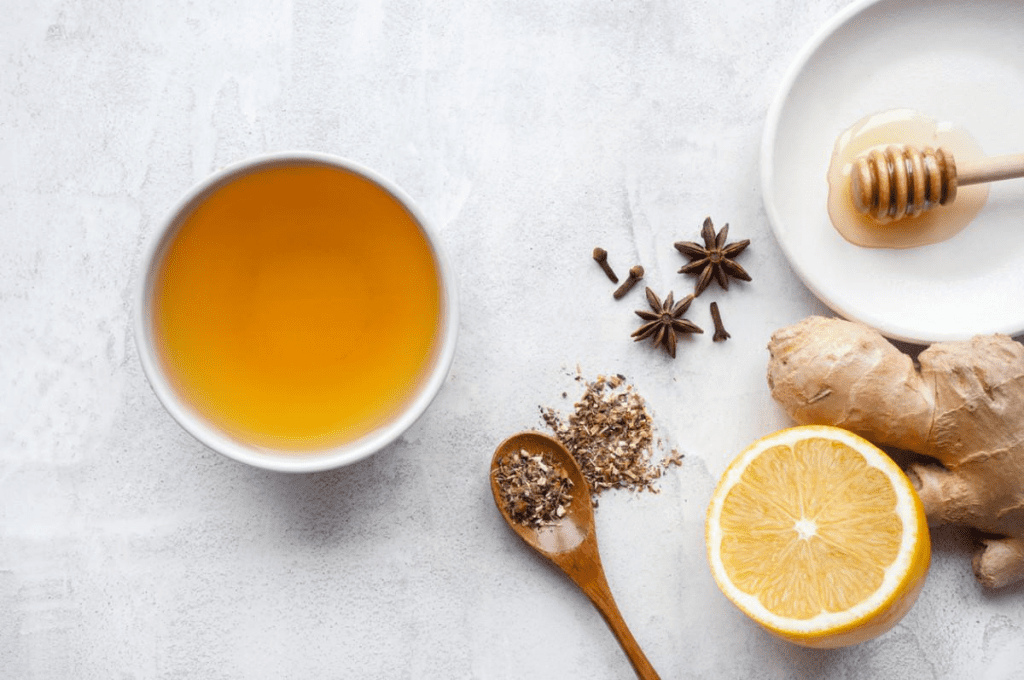
Ginger contains several compounds, including the ones that can help reduce blood sugar levels and regulate insulin response in people with diabetes. It has been proven that ginger acts as a natural appetite suppressant, which is the best way to lose weight. Researchers in a 2016 study trusted Sources on rats with diabetes found that ginger might help protect against heart problems due to diabetes. Ginger’s anti-inflammatory properties may also help prevent certain diabetes complications.
This wonder spice has been used for thousands of years for treating various ailments, such as indigestion, nausea, vomiting, cough, and colds. Ginger can be a practical addition to your diabetes treatment if you use it in moderation. Eating up to 4 grams per day may help lower your blood sugar levels and regulate insulin production. Be sure to talk with your doctor before adding this to your treatment regimen. Together you can determine the best dosage for you, as well as discuss any potential side effects.
4. Chamomile tea for Diabetes

Chamomile tea can help lower blood sugar levels and prevent complications arising from diabetes, including kidney disease, blindness, etc. Drinking chamomile tea can also help you lose weight, lower stress levels, regulate sleep, and soothe menstrual symptoms, among others. Japanese scientists gave a group of rats with diabetes a chamomile extract every day for three weeks, while a control group received a placebo. Researchers found that the rats consuming chamomile had significantly lower blood glucose levels.
Studies show that chamomile can also suppress enzymes linked to an increased risk of complications commonly associated with diabetes, such as vision, kidney, and nerve damage. Of course, animal studies are a far cry from human clinical trials. But adding a cup or two of chamomile tea to your daily routine isn’t a bad idea – whether you have diabetes or not. Try drinking it with or right after meals, as chamomile has also been shown to aid in digestion and prevent heartburn and flatulence.
5. Hibiscus tea for Diabetes

Rich in vitamin C, minerals, and various antioxidants, hibiscus tea can help control blood sugar type 2 diabetes. The health benefits of drinking hibiscus tea also include lowering blood pressure and cholesterol and reducing cancer risk. It can also speed up metabolism and thus aids in gradual weight loss. Hibiscus tea may help people with type 2 diabetes better control their blood glucose (sugar). Much of the current evidence is based on animal research, including a 2013 study published in Pharmacognosy Research. An injected extract of H. sabdariffa reduced the blood glucose in rats by 12 percent. Interestingly, normal rats injected with the same extract experienced no change in their glucose levels.
Another issue facing people with diabetes is the impact the disease has on blood lipid (fat) levels. People with diabetes tend to have less “good” cholesterol and more “bad” cholesterol in their blood, both of which increase the risk of heart disease and stroke. In a 2009 study published in the Journal of Alternative and Complementary Medicine, researchers provided the 60 people with diabetes either hibiscus tea or black tea to drink twice daily for 30 days.
Of the 53 people who completed the study, those in the hibiscus arm had a significant increase in “good” high-density lipoprotein (HDL) cholesterol and decreased “bad” low-density lipoprotein (LDL) cholesterol compared to the black tea arm. Total cholesterol and triglyceride levels were also consistently lowered.
6. Bilberry Tea for Diabetes
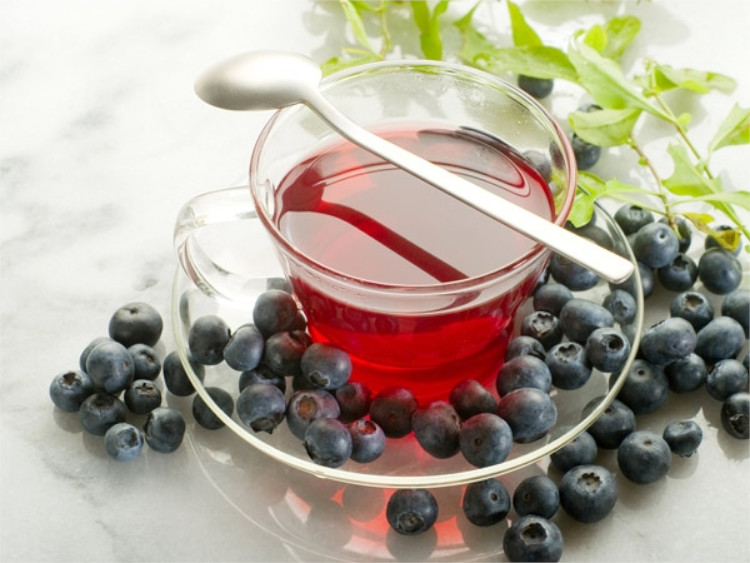
Have you ever heard of it? Well, maybe you know the Bilberry by its more popular name of the American Huckleberry. Bilberry herbal tea is the most effective herbal tea in aiding diabetes for those who are not insulin-dependent. So mainly, we’re discussing those individuals who have type 2 diabetes benefiting from Bilberry tea.
Research studies indicate that a compound in bilberries, anthocyanosides, promotes blood vessel strength which could have protective properties against forms of retinal damage in people with diabetes. Anthocyanosides are a part of a class of nutrients called flavonoids found in several fruits and other plants. Anthocyanosides are found abundantly in several purple, blue and red berries and also in purple-colored vegetables.
The reason behind Bilberry tea’s effectiveness in lowering blood sugar levels is because it contains something called glucoquinine, which is a compound known for its ability to lower blood sugar levels. Another reason why Bilberry tea is such an excellent herbal addition to one’s holistic medicine cabinet is that it is often used to treat eye issues. One of them is diabetic neuropathy, a symptom that usually accompanies those with type 2 diabetes.
7. Sage Tea for Diabetes
There are many medicinal uses for Sage tea, and one of them happens to be its most positive effect on how your body uses insulin. Studies have shown that Sage can boost insulin activity in diabetics. Those with type 2 diabetes found Sage to be the most effective herb within their holistic cabinet.

Along with being an effective aid in Diabetes control, Sage tea is known for its positive effect on liver function. A liver that is not functioning at its best can lead to headaches, fatigue, and reduced immunity. So Sage’s positive impact on the liver and insulin-boosting qualities seems to be one of its greatest medicinal effects.
The leaves of common sage have been used traditionally as a remedy against diabetes. Human and animal research indicates that it may help lower blood sugar levels. In one study, the sage extract reduced blood glucose levels in rats with type 1 diabetes by activating a specific receptor. When this receptor is activated, it can help precise excess free fatty acids in the blood, improving insulin sensitivity.
Another study in mice with type 2 diabetes found that sage tea acts like metformin — a drug prescribed to manage blood sugar in people with the same disease. In humans, sage leaf extract has been shown to lower blood sugar and improve insulin sensitivity with a similar effect as rosiglitazone, another anti-diabetes drug.
8. Nettle Tea for Diabetes
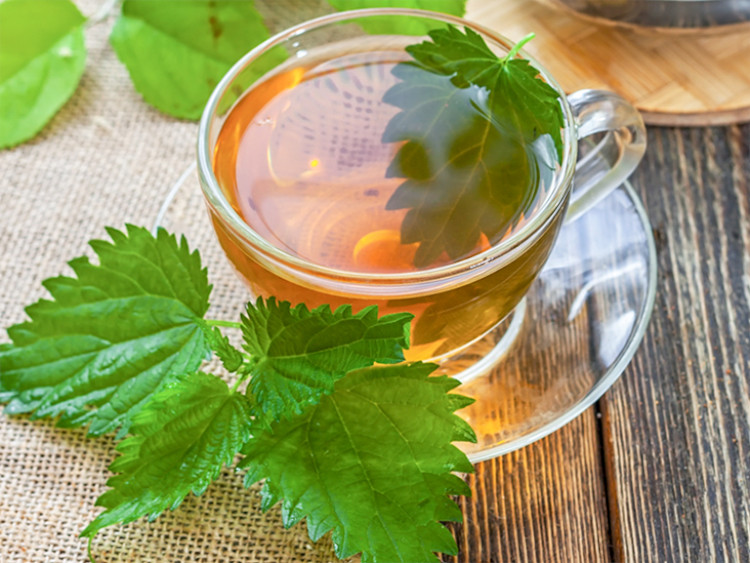
Nettle seems to be a panacea of holistic wealth for many individuals. Known for its detoxifying qualities, it’s also becoming a practical aid for those who have type 1 diabetes. Stinging Nettles have been shown to lower blood glucose levels as a medicinal plant noted in writings such as those of Nvicenna. Nettle has shown some promising effects on blood glucose levels. It may help the pancreas make or release more insulin, the hormone that lowers blood sugar.
In a 2013 study, nettle leaf extract lowered blood glucose and A1C in a group of people with type 2 diabetes who were taking insulin and oral diabetes medications. Recently, there have also been other investigations that indicate the hypoglycemic effect of the Stinging Nettle plant. The active ingredient in Stinging Nettle caused a marked increase in insulin secretion during experiments. A simultaneous assay of glucose showed that the increase in insulin was associated with decreased glucose levels.
Rounding Off: The Best Tea for Diabetes?
Teas such as black tea, green tea, and oolong tea contain polyphenols which researchers believe may increase insulin activity. An American study of 2002 found, however, that the addition of milk in tea decreased the insulin-sensitizing effects of tea. Polyphenols are known to have anti-oxidative properties which can help protect against inflammation and carcinogens. In other words, the properties in tea can help prevent type 2 diabetes and cancer. Tea also contains tiny micronutrients called flavonoids, which can help parts of the body to function better. There are many different types of flavonoids and each has other health properties. One flavonoid of interest found in tea is theanine, which can help control blood pressure and lower stress.



